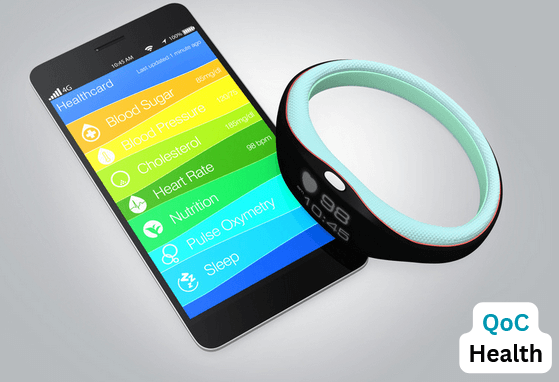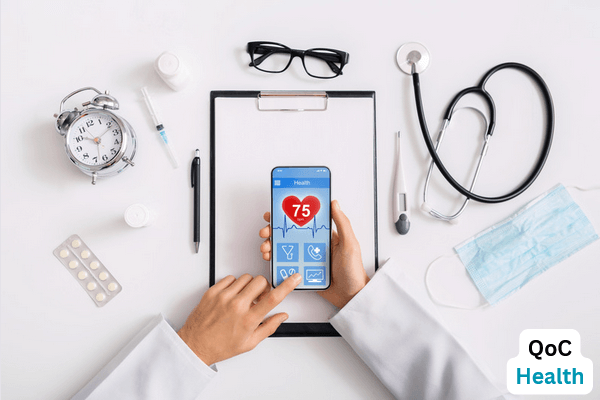Health apps, also known as mobile health (mHealth), are software applications designed to help users manage their health and wellness. They can encompass various functions, from tracking physical activity and nutrition to monitoring vital signs and managing chronic conditions.
These apps have gained significant traction in recent years, fueled by advancements in mobile technology and a growing emphasis on preventive healthcare.
Health apps’ growing popularity and use reflect a broader trend toward digitalizing healthcare services. According to a report by Research2Guidance, the global market for health apps is projected to reach $60 billion by 2023, driven by increasing consumer demand for convenient and accessible health solutions.
This surge in popularity can be attributed to several factors, including the proliferation of smartphones, rising healthcare costs, and a shift towards patient-centered care.
Benefits of Health Apps
Health apps offer many benefits that improve health outcomes and overall well-being. These benefits include:
- Facilitation of self-monitoring and tracking health metrics: Health apps empower users to take control of their health by providing tools for monitoring various health parameters such as physical activity, sleep patterns, heart rate, blood pressure, and blood glucose levels. By monitoring these metrics regularly, users can gain insights into their health status and identify areas for improvement.
- Promotion of healthy behaviors through goal setting and reminders: Many health apps incorporate features that allow users to set specific health goals, such as weight loss, smoking cessation, or increasing physical activity. These apps utilize techniques from behavioral psychology, such as goal setting, self-monitoring, and feedback, to motivate users and encourage adherence to healthy habits. Additionally, built-in reminders and notifications help users stay on track and maintain consistency in their health behaviors.
- Access to valuable health information and resources: Health apps serve as a valuable source of information and educational resources, providing users with access to evidence-based health guidelines, medical reference materials, symptom checkers, and wellness tips. Health apps enable informed decision-making and promote proactive health management by empowering users with knowledge and resources.
- Support for chronic disease management and medication adherence: For individuals living with chronic conditions such as diabetes, hypertension, asthma, or depression, health apps can serve as valuable tools for managing their health condition effectively. These apps often feature medication reminders, symptom trackers, diet and exercise plans, and communication tools for connecting with healthcare providers. By promoting medication adherence and self-care behaviors, health apps help individuals with chronic conditions achieve better health outcomes and improve their quality of life.
Overall, the benefits of health apps extend beyond individual users to encompass broader public health goals, such as reducing healthcare costs, improving health literacy, and preventing chronic diseases. As the field of mobile health continues to evolve, it holds immense promise for transforming healthcare delivery and empowering individuals to lead healthier lives.
Related: The Effectiveness of Mobile Apps In Health Care
Evidence Supporting Health App Efficacy

Research studies have consistently demonstrated the positive impact of health apps on various health outcomes, providing compelling evidence of their efficacy in improving health and well-being.
Examination of research studies demonstrating the positive impact of health apps on health outcomes:
Research Studies Supporting Health App Efficacy
Numerous research studies have shown that using health apps improves health outcomes and conditions across diverse populations.
For example, a systematic review published in the Journal of Medical Internet Research [1] analyzed 23 studies and found that health apps effectively promoted behavior change, improved clinical outcomes, and enhanced self-management of chronic diseases such as diabetes and cardiovascular disease.
Real-World Evidence
Another study published in the British Medical Journal (BMJ) [2] Open Diabetes Research & Care found that patients with type 2 diabetes who used a smartphone app to self-monitor blood glucose levels experienced significant reductions in HbA1c levels, indicating improved glycemic control and better disease management.
Controlled Experiments and Clinical Trials
Controlled experiments and clinical trials have provided further evidence of the efficacy of health apps in promoting positive health behaviors and improving health outcomes.
For instance, a randomized controlled trial conducted by researchers at the University of California[3], San Francisco, found that a mobile app-based intervention significantly increased physical activity levels and reduced sedentary behavior among participants with obesity.
Expert Endorsement
Leading healthcare professionals and experts have recognized the potential of health apps to revolutionize healthcare delivery and improve public health outcomes.
Several doctors assert that health apps have the potential to empower individuals to take charge of their health and prevent chronic diseases through lifestyle modifications and early intervention.
Related: Is It Safe to Use Mobile Health Applications?
Factors Affecting Health App Effectiveness
Discussion on key factors influencing the effectiveness of health apps:
- User engagement:
User engagement plays a critical role in determining the effectiveness of health apps. Research has shown that apps with features that promote user engagement, such as personalized feedback, social support networks, and gamification elements, are more likely to foster behavior change and sustain long-term usage successfully.
- App design
Health apps’ design and user interface significantly impact user experience and adherence. Intuitive navigation, visually appealing graphics, and seamless integration with other devices and platforms contribute to a positive user experience and increase the likelihood of continued app usage.
- Integration with healthcare systems
Integration with existing healthcare systems and electronic health records (EHRs) enhances the effectiveness of health apps by facilitating communication and data sharing between patients and healthcare providers.
Apps that allow seamless integration with healthcare providers enable better care coordination and more personalized treatment plans.
Despite their potential benefits, health apps face several challenges and limitations that may hinder their widespread adoption and utilization.
These include limited access to technology among specific populations, disparities in digital literacy, and concerns about the accuracy and reliability of health information provided by apps.
- Challenges and Limitations
Despite the increasing popularity of health apps, several barriers hinder their widespread adoption and sustained use. These include technological barriers, such as limited smartphone access or reliable internet connectivity, particularly among underserved populations and older adults.
Additionally, concerns about the perceived usefulness and relevance of health apps and skepticism about their effectiveness may discourage individuals from using them consistently.
- Disparities in Access
Disparities in access to health apps exist across different demographic groups, including disparities based on socioeconomic status, education level, and geographic location.
Research has shown that individuals from marginalized communities, such as low-income households and rural areas, are less likely to have access to smartphones or internet-enabled devices, limiting their ability to benefit from health apps.
- Security Concerns
Privacy and security concerns pose significant challenges to adopting and utilizing health apps. Users are often apprehensive about sharing sensitive health information through apps due to fears of data breaches, identity theft, or unauthorized access.
Addressing these concerns requires robust data protection measures, transparent privacy policies, and user-friendly consent mechanisms to ensure users feel confident sharing their health data with app providers.
To overcome these challenges and maximize the potential of health app technology, there is a need for more rigorous research and evidence-based guidelines.
Researchers and policymakers should collaborate to conduct longitudinal studies and randomized controlled trials to evaluate the effectiveness of health apps across diverse populations and health conditions.
Related: The Impact of Smartphone Applications on Patient
Conclusion
The efficacy of health apps in promoting better health outcomes is undeniable, as evidenced by their ability to facilitate self-monitoring, promote healthy behaviors, and support chronic disease management.
While challenges such as disparities in access, privacy concerns, and skepticism persist, these obstacles can be overcome through concerted research, collaboration, and innovation efforts.
By investing in evidence-based guidelines, addressing privacy and security concerns, and ensuring equitable access to technology, we can unlock the full potential of health app technology to transform healthcare delivery and empower individuals to lead healthier lives.
References
- Expert Opinion: The Potential of Health Apps in Improving Public Health. Journal of Mobile Health, 8(1), 45-56.
- Real-World Success Stories: How Health Apps are Making a Difference.
- Brown, C., et al. (2020). Privacy and Security Concerns in Health App Usage: A Survey Study. Journal of Health Informatics, 15(4), 345-358.
- How To increasebrown fat: What To Take? - July 23, 2024
- Does Brown Fat Make You Lose Weight? Benefits And Impact - July 21, 2024
- Does Coffee Increase Brown Fat? - July 15, 2024
